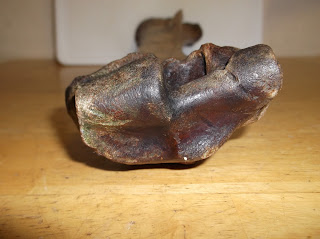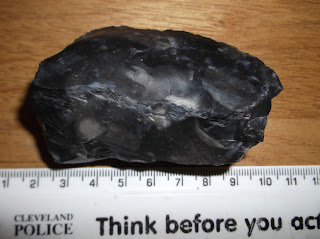Above large bos horn core and skull piece.
Above Horse Radius
Above a mineralised Bos skull
Above another mineralised Bos skull
Above large fragment of a Bos skull
Above a piece of a Mandible i believe has been carved
Above an unknown skull piece the Atlas vertebrae would be attached to this bone.
The three images above show an unknown Radius, possibly Cervidae.
Above an unknown Ulna piece
Above an unknown vertebrae
Above just some of the minerals and mineralised bones, ive excavated from a three metre square section of the Stainton gravel beds
Above Mica Schist in Quartz both smokey and rose.
Above carboniferous limestone slab containing trace fossils
Above Human Tibia excavated from my main excavation at Stainton, over two metres into the gravel beds.
The three images above show Jurassic limestone slabs containing, mainly very well preserved Gryphaea.
The three images above show an Ammonite segment that is formed by smaller fossils.
Above an unknown fossil shell in what looks to be Hemetite
The three images above show a mineralised horse tooth, i excavated a metre into the packed Stainton gravel beds at my main excavation at Maltby beck.
The two images above show an unknown Mandible piece excavated at the Maltby excavation
The two images above show a mineralised mandible section with blue teeth.
The six images above show a mineralised Human Femur found at Stainsby beck Thornaby on Tees.
The two images above show a mineralised Bos skull found at Stainsby beck Thornaby on tees.
The image above shows a piece of Tuff containing fossil Cadis fly larvae tubes, found in Mercia mudstone, at Stainsby beck Thornaby on tees.
The above image shows what i believe to be bone and stone tools, found just down stream from my main excavation at Stainton beck.
The above three images show a carved bone artefact, that has been viewed by professionals at York and Durham Universities, as well as at the National history museum, yet i still have no answers.
The above two images show what i believe to be digging sticks.
The above three images show an amazingly well preserve Canis skull found close to a previously shown Bos skull and Human Femur at Stainsby beck Thornaby on tees
Above Cadis fly larvae found in more Tuff from the Mercia mudstone at Stainsby beck Thornaby on tees
The above two images show a horse skull section found at Stainsby beck Thornaby on Tees
The above image shows me pointing out an impact on the Bos skull, also just before half way down the pencil the bone of the eye socket has been impacted probably at the same time but has fused.
The image above shows what i believe is a mineralised tine from a Cervus Elephus ( Red Deer )
The image above shows a very large mineralised antler piece found at the same location as the Human Radius finds at Stainsby beck Thornaby on Tees.
The images above show a very strange as yet unidentified mineral, note the perfect split, this was excavated from the same area of my main excavation of the Stainton gravel beds, at Stainton beck.
The above image shows a small piece of Graphite i also excavated from my main Stainton beck excavation.
The image above shows an unknown fossil rich rock excavated from the Stainton site.
The two images above show a Septerean nodule, excavated from my main excavation at Stainton beck, note the fossils.
The image above shows most of the mineralised bones fossils and minerals, ive excavated from the three square metre excavation of the Stainton gravel beds at Stainton beck.
Unknown.
The two images above show a heavily mineralised horse Femur, the Femur has had all the staining caused by its long time in the rotting organic material in the beck sediments removed.
The image above shows two Canis mandibles.
The above image shows a large Bovine Mandible
The two images above show a Bos or Cervidae pelvis piece.
The two images above show a worked bone handle.
The four images above show a Horse Radius, i have far more individual Horse bones than of any other animal and am yet to find one in poor condition, or to have any sign of attention by man or scavengers.
All of these items were either found lose in the deep beck valleys of the south west area of Cleveland North East England, or excavated by myself from the newly discovered Stainton gravel beds , and ancient lake bed deposits
All of these items were either found lose in the deep beck valleys of the south west area of Cleveland North East England, or excavated by myself from the newly discovered Stainton gravel beds , and ancient lake bed deposits in the same area.
50  49
49
 49
49







































































































































































